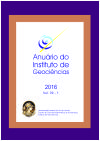Creation of Museums as Strategy for Preservation of the Fossil Heritage of Araripe Sedimentary Basin in Pernambuco, NE, Brazil
DOI:
https://doi.org/10.11137/2016_2_36_42Keywords:
Museums, Paleontological heritage, Araripe Basin, State of PernambucoAbstract
The Araripe Basin portion located in the Pernambuco state of Brazil has excellent Santana Formation outcrops. This internationally known unit has provided some of the most important concretion preserved vertebrate fossils of the Lower Cretaceous (~110 Ma) Gondwana. Although this region has its potential for fossil collecting eased by the gypsum extraction in surface mines (known as the ‘Araripe Plast Pole'), there are currently no fossil Patrimony preservation actions in the area. Given both the mining and paleontological potentials of these localities it is relevant to develop programmes, projects, and measures to promote its natural resources for educational, touristic, social, and sustainable porpuses. Here we propose the creation of paleontological museums in some of the Araripe municipalities within the Pernambuco state. These museums will be strategic for the sustainability of these resources to generate culture and profit for this region. These museums will also preserve the ‘Earth's paleobiological memory' by protecting our fossils for future generations.Downloads
Download data is not yet available.
Downloads
Published
2016-06-23
How to Cite
Barreto, A. M. F. (2016) “Creation of Museums as Strategy for Preservation of the Fossil Heritage of Araripe Sedimentary Basin in Pernambuco, NE, Brazil”, Anuário do Instituto de Geociências. Rio de Janeiro, BR, 39(2), pp. 36–42. doi: 10.11137/2016_2_36_42.
Issue
Section
não definida
License
This journal is licensed under a Creative Commons — Attribution 4.0 International — CC BY 4.0, which permits use, distribution and reproduction in any medium, provided the original work is properly cited.















